Physical Address
304 North Cardinal St.
Dorchester Center, MA 02124
Physical Address
304 North Cardinal St.
Dorchester Center, MA 02124
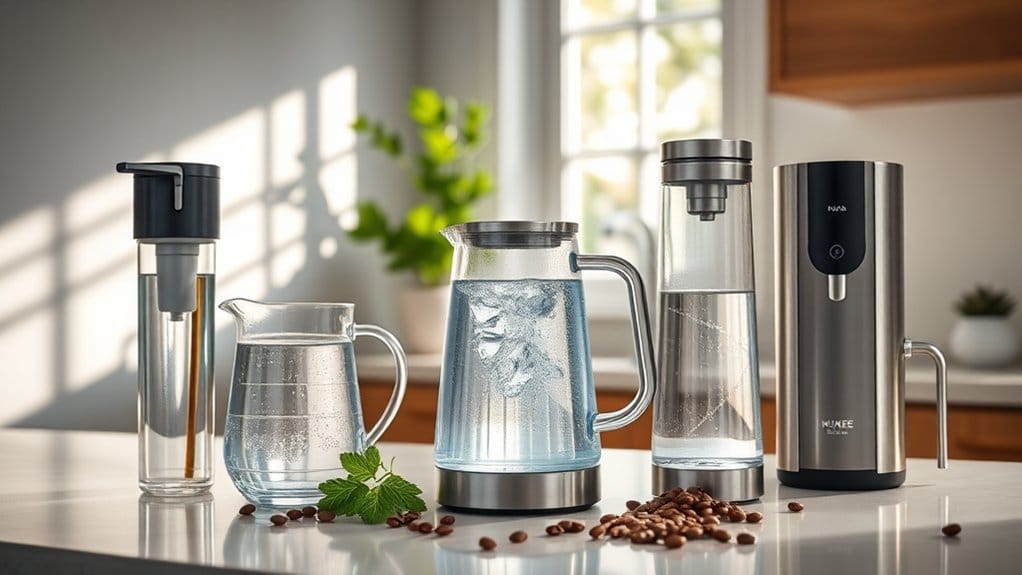
Want a tastier brew? Start with pitcher water filters for everyday convenience. Alkaline filters can smooth out acidity, whereas reverse osmosis systems offer pure flavor. Commercial-grade filtration suits those brewing in high volumes, and ion-exchange filters keep water soft, preventing annoying scale buildup. Each method has its perks to brighten your coffee experience. Curious about multi-stage carbon filtration or cost-effective solutions? Stick around to investigate more options that’ll enhance your morning cup!
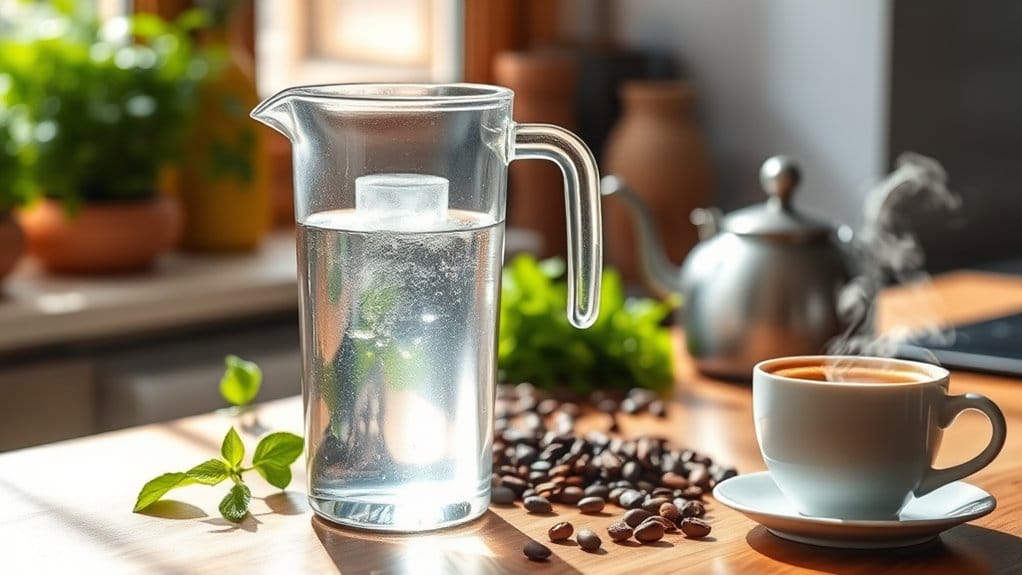
In regards to brewing the perfect cup of coffee, great water quality is key. That’s where pitcher water filters come into play; they not only enhance the taste of coffee but also ensure the removal of impurities that can affect flavor. Using filtered water in coffee brewing significantly improves extraction and aroma, ultimately leading to a richer coffee experience. Furthermore, utilizing soft, chlorine-free water helps to extract the best flavors from the coffee beans.
Want to improve your coffee game? Alkaline water filters might be your secret weapon!
With a higher pH than regular water, alkaline options neutralize coffee’s natural acidity. This means you’ll enjoy a smoother, less bitter brew that won’t wreak havoc on your stomach. Plus, the minerals like magnesium and calcium help bring out all those sweet, fruity notes in your cup. Alkaline water may also improve hydration due to smaller water molecule clusters. Additionally, the right ratio and temperature during brewing can significantly enhance the flavors extracted from your coffee.
Bid farewell to flat flavors! Simply grab an alkaline water pitcher or a filter system, and you’re set. You’ll notice consistency in flavor, making your coffee experience even more delightful.
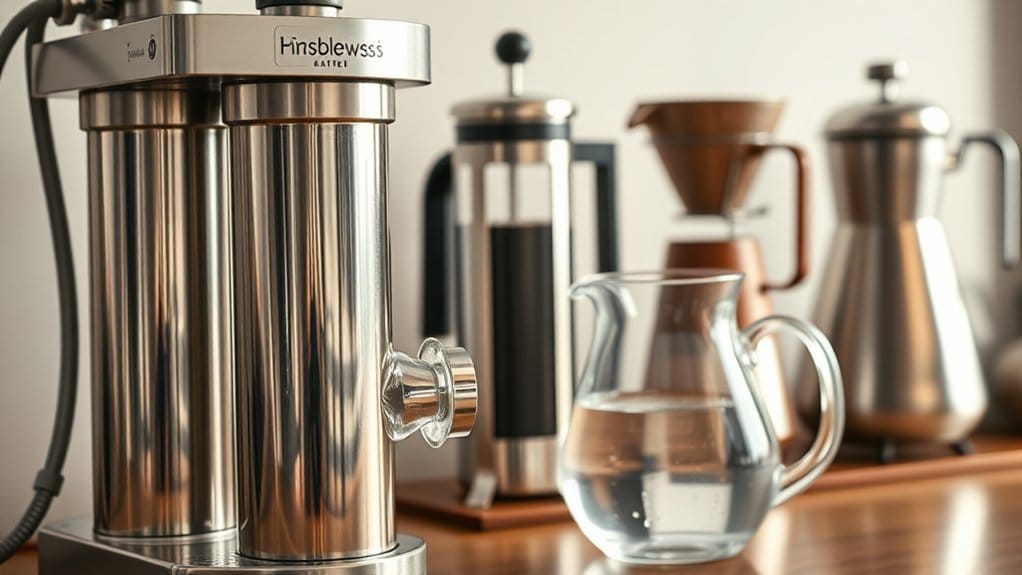
When you’re brewing your favorite coffee or tea, the water you use can make all the difference.
Reverse osmosis systems filter water at a molecular level, giving you pure, clean water. You’ll notice the difference right away! These systems force water through a semipermeable membrane, blocking contaminants like chlorine and heavy metals. Reverse osmosis ensures a consistent water profile, allowing you to create the perfect balance of minerals for your desired flavor.
Bid farewell to off-flavors that mess with your aroma and taste! You can even tailor your water’s minerals for different brews. This means consistent flavors in every cup, whether brewing a light lager or a sturdy stout.
Certainly, they require some upkeep and can be pricey upfront, but think of the quality and savings in the long run—what’s not to love about that?
Imagine running a thriving brewery, churning out delicious brews day after day. To keep up with demand, you need commercial-grade filtration systems. These systems tackle high volumes effortlessly, ensuring your water stays pure and tasty.
Water softeners are crucial; they zap away hardness minerals, preventing annoying scale from ruining your equipment. It’s like giving your machinery a spa day!
Plus, UV disinfection offers a chemical-free way to eliminate harmful microorganisms. No funky tastes here!
And don’t forget about blending valves, which help you achieve that perfect mineral balance for your brews. With automated systems ready to adapt, you can focus on what you do best—crafting amazing beer without any headaches. Cheers to that!
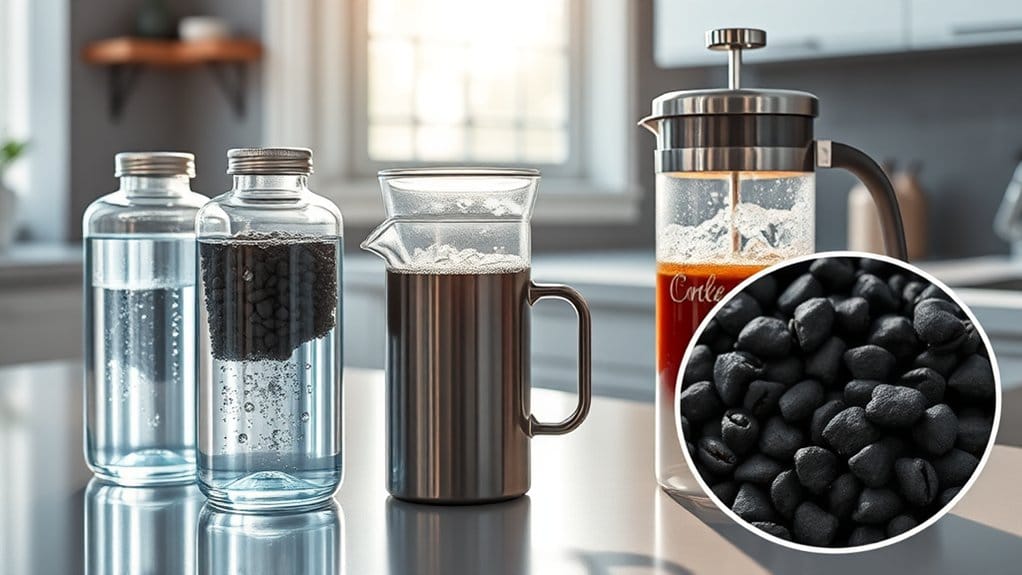
Brewing great beer isn’t just about the hops and malt; it all starts with the water. Using multi-stage carbon filtration, you can transform your brewing experience. This method removes chlorine and chloramines, guaranteeing your water tastes fresh and clean.
Think about it: nobody wants a hint of medicinal flavor in their favorite brew!
With a combination of activated carbon and pre-filters, the process keeps your water clear and pure. Each stage targets different impurities, banishing any leftover rancid odors or unpleasant tastes.
Plus, by protecting your equipment from corrosive elements, you’re making certain your brewing setup lasts longer. So, why not give your beer the best chance? Trust me, your taste buds will thank you!
Ever wondered how to make your water the perfect companion to your favorite brews? Ion-exchange filters might just be your answer!
These filters soften your water by swapping out hard minerals like calcium and magnesium for sodium or potassium. This gentle exchange creates beautifully clean water without the scale that can clog your precious brewing gear.
Plus, it helps avoid that chalky residue that can ruin flavor extraction, allowing you to extract every delicious note. The process isn’t complicated, but it does need some upkeep. Regular salt replenishment keeps the system working like a charm.
Just remember, during softened water is great, you might need to supplement minerals for a richer beer flavor. Enjoy brewing!
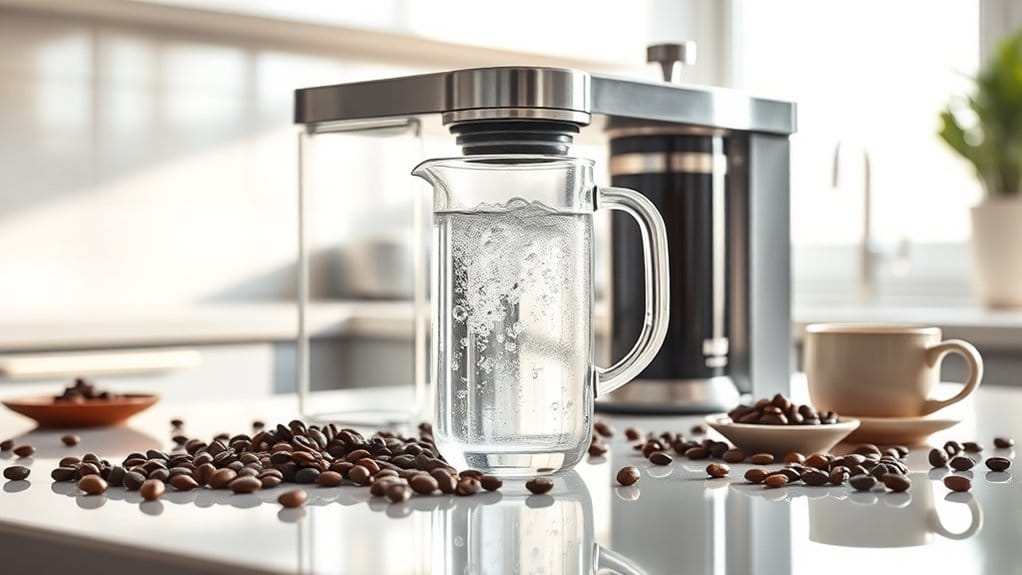
When it comes to keeping your coffee machine in top shape, scale inhibition filters offer a smart and budget-friendly solution.
They work by releasing polyphosphate media, which prevents troublesome minerals like calcium from forming scale in your brewer. Certainly, they’re not foolproof, but they noticeably slow down scale buildup. Using them can save you from unexpected repairs and costly maintenance down the line.
Imagine brewing a cup of coffee that tastes heavenly, rather than metallic! Plus, these filters are easy to install and often come with handy mounting brackets.
Just remember, some filters mightn’t be compatible with all machines, so double-check with the manufacturer. After all, you want to sip, not stress!
You should replace your water filter cartridges every 3 to 6 months, even though sediment filters may need monthly changes. Always watch for signs like decreased flow or strange tastes indicating it’s time for a replacement.
You can use filtered water for various beverages, like tea and juices. It improves flavors by removing impurities, ensuring your drinks taste fresher and more lively, making every sip more enjoyable.
Filtered water greatly affects espresso brewing differently than regular coffee. It improves clarity, smoothness, and flavor balance during the process of minimizing bitterness, providing a consistent taste. You’ll notice these improvements more intensely because of espresso’s concentrated extraction process.
The best water temperature for brewing with filtered water is between 195°F and 205°F. This range optimizes flavor extraction, keeping your coffee from being too sour or bitter, enhancing your overall brewing experience.
In terms of coffee brewing, brands like ZeroWater and Clearly Filtered stand out. Their advanced filtration systems effectively remove contaminants as well as preserving crucial minerals, ensuring you get the best flavor and quality in every cup.